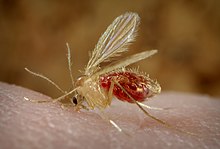Phlebotominae
| Sand flies | |
|---|---|
 |
|
| Phlebotomus papatasi | |
| Scientific classification | |
| Kingdom: | Animalia |
| Phylum: | Arthropoda |
| Class: | Insecta |
| Order: | Diptera |
| Suborder: | |
| Infraorder: | Psychodomorpha |
| Family: | Psychodidae |
| Subfamily: | Phlebotominae |
| Genera | |
Brumptomyia
Lutzomyia
Phlebotomus
Sergentomyia
Warileya
The Phlebotominae are a subfamily of the family Psychodidae. In several countries, their common name is sand fly; but that name is also applied to other flies known as sandflies. The Phlebotominae include many genera of blood-feeding (hematophagous) flies, including the primary vectors of leishmaniasis, bartonellosis and pappataci fever. In the New World, leishmaniasis is spread by sand flies in the genus Lutzomyia, which commonly live in caves, where their main hosts are bats. In the Old World, sand flies in the genus Phlebotomus spread leishmaniasis.
Phlebotomine females, and only females, suck blood from various mammals, reptiles and birds. Some species are selective, whereas others bite any suitable host they find. Some species can produce one clutch of eggs before their first blood meal; such females are said to practise autogenous or partly autogenous reproduction. Other species need a blood meal before they can produce any eggs at all; they are said to practise anautogenous reproduction. As far as is known, all species need a blood meal for every following clutch of eggs. Proteins and other nutrients in the blood they eat enable the female to produce the proteins and fats necessary for them to produce eggs after using up their bodily food stores. In feeding on blood, the flies use their mouthparts to start the host bleeding. They then suck up the exposed blood. Like practically all blood-feeding parasites, they inject biochemicals that inhibit blood clotting, plus some that stimulate host mast cells to produce histamine; this distends capillary vessels, thereby promoting blood flow.
...
Wikipedia
